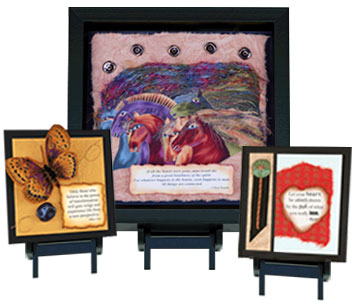|

Issue #19, December, 2007
Welcome
to the December 2007 issue of the Elderwoman Newsletter
- an e-zine for
21st century elderwomen committed to radical aliveness.

|
This
is a smaller than usual newsletter. I expect everyone has been too busy
preparing for the end-of-year festivities to think about submitting
articles. But never mind. There is no rule that says newsletters have
to be any particular length, after all.
|
Here
in the Northern Hemisphere, we are in the grip of winter, and as I
write this, we have just passed the Winter Solstice - the turning point
of the year. From now on, the days will start to get imperceptibly
longer as we inch back towards the light.
It is a beautiful time of year - a time of resting and hibernating and
also of feasting and drawing closer to those we love, either in person
or from afar.
With our family so spread out across the globe, Sky and I are
ever-thankful for the technology of modern communications - the
telephone, email, the Internet. Here we are in our little cottage, down
our tiny, country lane in the back of nowhere and yet it always feels
as though we are at the centre of the world, part of a vast web of
connectivity the circles the Earth.
Whether you are sitting by the fire in the middle of winter or - for
those of you Downunder - enjoying the warmth of the midsummer sun, I
wish you all the very best for this festive season and a bright and
prosperous New Year ahead.
Many blessings,
About the picture ...
In Italy, the creation of nativity scenes, or presepi has long flourished as a popular art. A presepecan
take almost any form, ranging from traditional to postmodern, and
so much artistic license is taken that the actual nativity theme can be
sometimes be hard to discern but all are constructed with the utmost
care and attention to detail. One gets the feeling that there is even
more pleasure to be had in creating these models than there is in
finishing and displaying them. Earlier this year, Sky and I
happened upon an exhibition of presepi
in Maratea and the child in me was utterly enchanted by them, just as I
have always been enchanted by dolls' houses. We spent a long, long time
in there, as I wanted to peer at every one - and there were lots.
|
FEATURE
ARTICLE
Ageism – the enemy within?
|
Some of us are
really good at recognizing ageism nowadays. And of those, there are a
few who habitually challenge it wherever and whenever they encounter
it, on behalf of us all. Thank goodness.
But how many of
us, I wonder, let the opportunities slip? How many of us, by our
passivity, allow this form of discrimination to flourish, like a weed
we notice but don't bother to pull out?
For example, when
somebody says "Sixty? Oh you really don't look it!" do you smile
sweetly and thank them for their ageist, so-called 'compliment' ? Or do
you challenge them by saying something like "I know you probably mean that as a compliment, but to me it really isn't …" ?
If it is a sin to
remain passive and fail to counter ageism, I guess we could borrow the
language of the church and call it a 'sin of omission'. But there are
sins of comission too. Ageism can flourish even within our own thinking
and in our habits of speech and interaction. Here are three places
where it often hides.
The 'still' syndrome
Can't remember
who coined the term – probably Ronni Bennett, though I remember
novelist Ruth Rendell mentioning 'still' as her pet hate (see March
newsletter). We have all heard it. Many of us have heard it said about
ourselves. And unfortunately, some of us, without thinking, do it
ourselves. "Isn't she amazing?", we hear ourselves say. "She is –fill in the
blank– years old and she is still …(riding her
bike/carrying a backpack, figure-skating/publishing
best-sellers/you-name-it)."
OK, it's nice if
we can go on doing the things we enjoy for as long as we want to do
them. But it doesn't make us any more amazing or clever or worthy of
applause than the person who had to give up hiking because of the
painful arthritis in her feet or the one who decided that she had
published enough novels and wanted to take up watercolours instead or
read some of the books she hadn't had time for yet, or play sudoku or
sit in the conservatory and nap.
Those of us who
are parents may recall an earlier equivalent of this – the 'already'
syndrome. "He's only ten months and he is already walking ….
she's already reading at a Grade three level and she's only five
… knows all his colours already … already toilet trained
… etc" – all guaranteed to make the parents of the
less amazing kids feel totally awful. So let's stop and check ourselves
if we hear that 'still' word trying to come out of our mouths in the context of aging.
Give 'er the money, Mabel!
Those of you who,
like me, are English and over 70 probably remember that old radio
quiz show with Wilfred Pickles where you only had to announce that you
were 85 or something and it would be "Oooh isn't she woonderful?" and
everyone would clap and cheer on cue.
We still do it. Applaud people simplyfor being old. I confess I've done it myself.
Maybe a healthy
lifestyle helps some people to attain a great age (I am counting on it,
actually) but we all know that the most important factor governing
longevity is genetics. Sure, we should respect and honour our elders,
but when you stop to think about it, to praise somebody just because they managed to live to 90 is to
insult, by implication, all those who didn't 'achieve' such a
'woonderful' age. Or at the very least, it could make the surviving
relatives of those who didn't get to that age feel sad. And when we effuse about how great people are for living to
a hundred, just think what effect our words might have on that
person standing a few feet away from us who has a life-threatening
condition and knows she will be lucky to make it to her sixtieth
birthday.
The '70 years young' thing.
If you tell me,
coyly, that you are X number of years 'young', (which women frequently
do - three have said it to me in this past week) I cannot help but infer that
you regard the word 'old' as at worst an insult or at best, something
to be avoided. And that, my friends, is just downright ageist. Same
with " …but I am young at heart". No, I'm sorry but your heart is the same age
as the rest of your internal organs. It may beat strongly and you may
be full of joy and zest and enthusiasm for living, but that doesn't
make you young. It simply means you are full of joy and zest and
enthusiasm for living, and so we should all be, whether we are five or
fifty or ninety-three or any other age.
So yes, let's
keep up our campaign against ageism until it becomes acknowledged more
widely as a form of discrimination that is just as non-PC as sexism or
racism.
And at the same
time, let's have a good look at ourselves and check for those corners
of our own psyches where, like ticks hiding in a fold of skin, those
little fragments of an ageist attitude might yet be lurking.
© Marian Van Eyk McCain, 2007
|
|
|

|

REPORTS/NEWS/BITS
AND PIECES
|
OUR NEW SOCIAL NETWORK
ELDERWOMANSPACE
Women growing old with joy and zest, wit and wisdom
As many of you already know,
I got the idea back in November that it would be a great idea to create
an online social network for elderwomen. Social networking is 'all the
rage' these days, with millions of people - mostly young ones -
flocking to sites like MySpace and Facebook. Those places aren't very
elder-friendly though. In fact, some have been known to be downright
unwelcoming. Yet I got the feeling that a lot of elders, especially
women, would like to have a site like that where they would feel
comfortable. And I decided to set one up. The result -
Elderwomanspace.
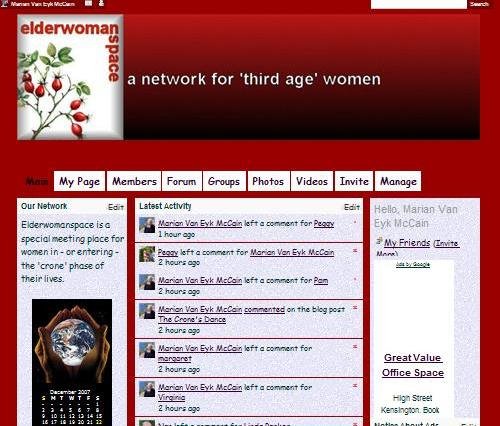
It is
a place where elderwomen can met each other, make new friends, start a
blog, (or feed one in from elsewhere), read other people's blogs, take
part in discussions, join - or form - special interest groups,
share thoughts, feelings, ideas, photos, videos, music. And it is
private. Membership is by invitation only so there is no danger of
'trolls'.

| back to top |
|
|
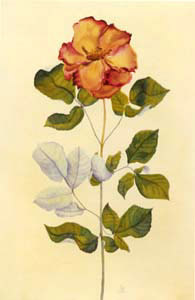
|
Lisa Wagner, who has been subscriber to this newsletter for just over a
year now and is also a member of the Discussion Group (and
Elderwomanspace), has just launched her new website Unconventional
Woman.com
'...a free resource website for women over 50. Especially for single women, and for
the single woman in all of us. . .
Not the woman who's looking for
love, but the one who's looking for her LIFE. '
|
What does she mean by 'unconventional'?
"I am using the word, Lisa says, ".. in
the sense of “having gone beyond convention”:
nonconformist, original, unique, exceptional, distinctive. This has
nothing to do with an unusual appearance or a flamboyant way of being
in the world, but with our internal lives."
In other words, she is talking about the same process that is one of the themes of Elderwoman – the process of crafting our selves and the lives we want to live. As she explains:
"We
receive a flood of 'shoulds' about every aspect of our lives. But what
is true for one person may not be true for another, what works for me
may not work for you. We are overwhelmed with input. We need to be able
to close our ears to the external chatter so we can hear the inner
voice.
The
closer you approach the essence of your life-- what gives you meaning
and purpose, what your body needs to be healthy, what makes you feel
excited about what you are doing, what kind of space you feel
comfortable in, how you relate happily to others—the more
distinctive your solutions will be.
In
this sense, to be truly unconventional is to become authentically
yourself, whoever that turns out to be. 'Yourself' may not bear much
resemblance to the person your parents raised, or to the woman you
thought you were."
Oh amen to that.
So how to go about this process of re-fashioning ourselves in the second half of our lives? The way Lisa sees it, the first task is one of self-examination: This means:
" …examining
and cleaning out a kind of 'clutter' from our internal houses: our own
seemingly endless assumptions and habitual beliefs as well as the
signals that we unconsciously receive from others which affect
everything from our minute-to-minute emotional states, to our health,
to what motivates us to action."
And then …?
"It requires getting new information and forming new attitudes, and perhaps new relationships, that nourish and support us."
Which is why
Lisa has created 'Unconventional Woman' – a website crammed
full with useful resources to assist other women on this journey of
self-discovery and re-creation.
I have spent
some time wandering around in her Aladdin's cave of essays, book
reviews, teachings, suggestions etc. and this is high-quality stuff. I
am not saying that just because she includes Elderwoman
on her resource list, though I must say I am delighted to find it
there. But because I think she has already assembled an impressive
collection of first-rate material and has organized it expertly in
categories – health, relationship, lifestyles, work and money
… and many more.. And this is only the beginning.
Not only
is 'Unconventional Woman' jam-packed with interesting material, it is
also beautifully designed, with a rich and mellow look that feels just
right for the subject matter. That should not surprise me. Lisa is a
gifted artist who works in several media. Her watercolours are sublime
and the visual richness of her oil paintings evokes thoughts of the old
Flemish masters. You can see some of her art at her other website : http://www.lisawagnerartist.com
I urge you to go to Unconventional Woman and have a look for yourself. And give Lisa your feedback. I know she would love to hear from you.
|
|
|
|
|
The Blessing Project™, which is the brainchild of long-time newsletter subscriber Debra Aaron, opens hearts through
powerful messages incorporated in exquisite art.
The items
used in these pieces are made from natural elements (beads, paper,
fabric, yarns, etc) by indigenous women's villages and cooperatives in
places such as Kenya. They are then lovingly crafted and assembled
by artists in North America.
Each of these exquisite, one-of-a-kind works of
art is infused with a blessing. They then find
their way to joyous gatherings, a workplace or a single pillow at bedtime,
delighting and awakening a strand of remembrance that unites minds, hearts and
souls.
The 'Light Workers', as Debra calls them, who assemble and distribute the cards experience a profound sense of
connection with their sisters in other lands by providing hope for blessing
across our planet while experiencing more meaning and purpose in their own
lives.
Profit from the sale of the pieces is used to start the cycle again in new villages across the
globe where women work diligently to improve their communities.
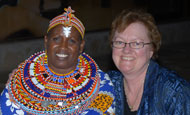
For more details - including a video - see www.theblessingproject.com
|

BOOK
REVIEWS
|
|
Lillian
Rubin, a sociologist and psychotherapist who has written eleven books
covering various stages of life, reflects on her later years in 60 ON UP: The Truth about Aging in America,
which O Magazine calls “a sharp, brazenly honest expose for the
78 million baby boomers who will grow old over the next two
decades.” The book covers all of the difficult questions of aging
in our time, including: What happens to family life when adult children
have to care for their aged parents? What do retirees experience when
they’ve lost their work identities and still have two, possibly
three decades to live?
|
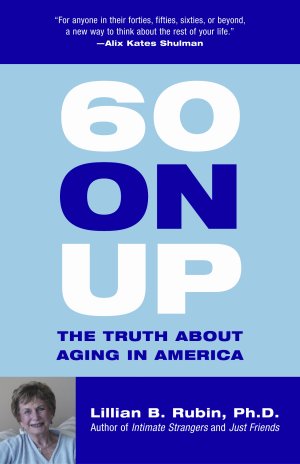
Beacon Press, Boston, 2007 |
And, more generally, the very
important question: What happens to a society when people routinely
live into their nineties, when “sixty is the new forty,” and thirty is
too young to settle down and start a family?
*********************************
When
the publisher offered me a review copy of this book by 83-year-old
Lilian Rubin, it seemed appropriate to accept. Though if I had read the
first sentence of the text I might well have thought otherwise. For the
book begins: "Getting old sucks! It always has, it always will."
That has certainly not been my experience, to date. But I am twelve
years younger than the venerable Dr. Rubin, so what would I know? Am I
living in a fool's paradise?
I asked Gaea Yudron to read the book and review it for us. Here is what she has to say:
Lillian Rubin is a
sociologist and psychotherapist now in her 80s and this is her twelfth
book. The author has done an excellent job of describing the current
cultural milieu around aging in America. Old age has been pushed back.
People live longer and overall are healthier. Now we have the young old
from 65 to 74, the old old from 75 to 84, and after 85 the oldest old.
The book, the author tells us early on, is about “the struggle to
cut through the thicket of social and psychological impediments along
the way.”
How do we find personal meaning in a society where worth is so equated with productivity?
What is the point of
living longer if one lacks meaningful connection? Rubin describes many
of the trials and tribulations that are part of aging, through a series
of interviews sprinkled through the book. Sixty or seventy year olds
caring for their eighty or ninety year old parents. Husbands or wives
developing Alzheimer’s or other serious diseases. The death of
friends and partners. The difficulty of living in a society that
dismisses and fears aging and old people. Even admitting that you are
retired has its perils, she points out, marking you as a person who is
useless.
Robert Butler, the
founding director of the National Institute of Aging , steered clear of
describing himself as retired. Rubin notes, if Robert Butler “a
man who almost single handedly created the field of aging, and its
serious study, and who at 80 still heads the International Longevity
Center…feels the chill of the “R word,” what chance
do ordinary men and women have?” Indeed. Ordinary men and women
have the chance—in fact they have an imperative-- to develop new
responses to stereotypes about aging.
The author suggests a
public conversation about aging that includes all of its complexity,
noting that issues confronting individuals and society are not
sufficiently described by mottos such as “the new old age”
or “sixty is the new forty,” or “aging is a treatable
medical disease.” Certainly, pushing aside our denial or aging
and engaging in this kind of national dialogue is a very necessary
task. 60 on Up does a great job of describing why that is so.
I found the
author’s self-described “angry resistence” to aging
and her suspicion about the spiritual dimensions of aging
disconcerting. I didn’t need to read between the lines to find
how and when I disagreed with her. There was even a moment when I had
to put the book down. It was when she told me that not only is society
revolted by the old, but the old are revolted by themselves, I
immediately set the book aside and went out to take a brisk walk.
Why was the author making
such a negative blanket statement-- a statement that was baldly ageist
to my mind, something that did not support the well-being of older
people? In spite of social bias against age, many older people feel
more content and balanced than they did earlier in their lives, as
numerous recent studies report.
The author touches little
on the deeper meaning and value of old age as a life passage. In fact,
she seems to have an issue with positive descriptions of old age.
She’s “fiercely realistic,” as one jacket quote
affirms. I myself prefer a little magic with my realism. But of course
magic takes many forms. And perhaps this is the kind of magic we need
now in order to take a frank look at what it means to grow old.
Is this book worth
reading? Yes, definitely. It is well-written, thought-provoking and
well-researched, a valuable contribution to the growing literature on
aging.
It felt as though there was an unspoken "but ..." on the end of that
review. And when I asked Gaea about it, she admitted that there was.
"I think her bias is
secular and materialistic," Gaea said. "Her book made me realize
that when people focus
so much in that fashion, aging is even harder for
them. They have no
spiritual dimension to work with. That made the book flat
in some way."
Gaea is so right. Unfortunately, I think a lot of old people ARE
revolted by their aging process and disgusted/impatient with
their elderly bodies. And that is really, really sad. Rather than
writers with an 'angry resistence' to aging, surely what we need
is lots more people who can write books about the spiritual
tasks of surrendering our bodies, bit by bit, back to the Earth
from whence they came and finally surrendering our whole beings,
fearlessly and graciously, back into the great mystery.
As Gaea says, without the spiritual dimension, it's Flatland.
So if you are going to read 60 On Up, I suggest you read - or re-read - Rabbi Schachter Shalomi's classic From Aging to Sage-ing or Ram Dass's Still Here as an antidote.
And/or read this next book..............
|
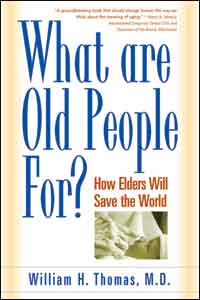
VanderWyk and Burnham, Acton MA 2004 |
"Let go of youth. It is but a flower.
To know old age is to dive deeply
into the very roots of life.
This is what is real, what is hidden
from the young, what enriches and
sustains us. Old age is not
something
that happens to us, it is who we are;
embrace it - and be made
whole."
~ Dr William H. Thomas |
If I had severe
reservations about Rubin's book, I have none whatsoever about this one.
Here, at last, is a gerontologist who not only understands pretty much
all there is to know about the aging process but also sees old age
as a deeply meaningful and significant phase of our lives.
The American tendency to equate being old with being sick, mirrors the view
of pregnancy and childbirth that held sway when the 'baby boomers' were born.
Obstetricians treated childbearing as an illness and drained almost every drop
of humanity from the experience of childbirth. Lamaze and others countered with
a focus on women and their families and a recognition of the joyful aspect of
birthing. Empowering the mother and strengthening her emotional support turned
out to be a terrific way of reducing the very real pain of childbirth.
Dr. Thomas shows that this approach succeeded because it embraced both
traditional ideas about birthing and clinical obstetrics. He writes that the
Lamaze method did not "...seek to restore the birthing practices of long ago.
Few would ever have accepted such a dangerous step backward. Instead it became a
hybrid of old and new, different from anything that had come before. We are now
preparing for a similar revolution that will transform old age and the lives of
elders the world over."
Drawing from popular culture, history, science and literature to explore what
aging really is, Thomas presents elderhood as a developmental stage of life that
is an essential part of a healthy society, as important in its own way as
childhood and active adulthood. He maintains that seeing old age solely in terms
of disease, disability and decline, damages our society.
At the heart of the fear of aging that grips so many adults is the dilemma of
dependence and independence. Being independent requires you to live in your own
home, no matter how dangerous and lonely that might become. Becoming dependent
can easily lead to the loss of one's home and a terrifying move into a nursing
home. These institutions are famous for stripping people of choice, freedom and
self-determination.
In What Are Old People For?, Dr. Thomas introduces a new vision of 'intentional communities,' of up to 10 elders who chose to live together with
the help of several younger adults and strive to become a true community. "Baby
boomers are the ideal generation to create this new model," says Thomas. "With a
higher level of education than any previous generation, a higher level of
wealth, and the well-established habit of re-inventing social norms, I think
baby boomers are going to find the concepts of intentional communities and the
approach to old age as a development stage instead of decline appealing and
consistent with their values. I just don't see boomers accepting the fate of a
nursing home."
The 'Eldertopia' that Dr. Thomas imagines is encouraged by evidence from a
number of extremely successful intentional communities, called Green Houses,
that Thomas has created in collaboration with partners around the country. "The
idea that only large-scale nursing homes can be cost-effective and provide
adequate medical care is false. It is time to liberate elders from
institutionalization that saps their dignity and breeds helplessness," says
Thomas.
In their place, Thomas advocates small group homes for the aged mainstreamed
into residential neighborhoods where elders can maintain their status as part of
the community, share a meal and a story with familiar companions, and relish the
simple pleasures and satisfaction of being old. With this new model, elders will
be able to share their wisdom and their legacy with the children and adults who
surround them, restoring them to an important place in our society.
Click here to
read an interview (in two parts) with Dr William Thomas on Ronni
Bennett's blog, 'Time Goes By'. (It was from the second part of the
interview that I took that wonderful quote, above. And I notice I am
not the only person to have turned it into an email sig file!)
Finally, click here for a Google page where you can read the whole book yourself - or at least dip into it.
|
POETRY
|
|
PLAY
by Carna Zacharias-Miller
Freckled clouds snoozing in your hair.
Snapdragons breaking through your skin.
Dollops of dreams jumping rope on your dog´s nose.
You remember this, don´t you.
It´s all up in the air, isn´t it,
you serious little person.
Up in the air,
where nobody catches you
when you fall.
But you have fallen many times before,
serious little person,
and because nobody was there to catch you,
you bounced right back
into the air.
You remember this, don´t you.
So, no need for getting your ducks in a row.
Stay right where you are,
up in the air.
Meet the other players.
Blow a covey of kisses over the treetops.
Sing a love song to the blue star.
Isn´t life sweet, honey.
Yes it is.
Carna Zacharias-Miller is an EFT (Emotional
Freedom Techniques) practitioner in Florida. She works with women
(mostly over the phone) who grew up without a mother, physically or
-more often- emotionally. "Missing Mother Syndrome" can affect the
whole life in painful ways. Many of her clients are in their fifties,
the oldest -so far- has been 73.
Website: www.missingmother.com
|


|
|
CALL
FOR SUBMISSIONS
Contributions
for this newsletter are eagerly sought. Please send in your writings,
your thoughts, your poetry, a book or website you have found, an
announcement or news item that you think would be interesting to
others, a comment on one of these articles, a subject you'd like to
see, an anecdote, something that moved you - whatever snippet you want
to share.
|
|
LAST
LAUGH
Philosophical Thoughts
Is Scotland the home of Oat Cuisine?
Do arachnophobics have a website?
How does the snow plough driver get to work in the morning?
How does the slowest driver always get to the front of the queue on a country lane?
Christmas Tale
A man in Chicago calls his son in New York the day before Christmas and says, 'I
hate to ruin Christmas this year, but I have to tell you that your mother and I
are divorcing; forty-five years of misery is enough.'
'Pop, what are you
talking about?' the son screams.
'We can't stand the sight of each other any
longer,' the father says. 'We're sick of each other, and I'm sick of talking
about this, so you call your sister in Atlanta and tell her.'
Frantic,
the son calls his sister, who explodes on the phone. 'Like hell they're getting
divorced,' she shouts, 'I'll take care of this.' She calls Chicago immediately,
and screams at her father, 'You are NOT getting divorced. Don't do a single
thing until I get there. I'm calling my brother back and we'll both be there
tomorrow. Until then, don't do a thing, DO YOU HEAR ME?' and hangs
up.
The old man hangs up his phone and turns to his wife, smiling. 'It worked, honey,' he
says. 'They're both coming for Christmas and they're paying their own way.'

|

The
Elderwoman Newsletter by Marian Van Eyk McCain, October, 2007
The Elderwoman website: http://www.elderwoman.org
Marian's e-mail: marian(at)elderwoman.org
NB: replace 'at' with the @ sign, and please
remember to
insert OKEM in the subject line to make sure you get through my three
layers of spam filtering!
Unfortunately,
the filters are a necessity to stop
my in-box flooding with spam.
- oh and when you write to me, please remember that my name
is spelt MARIAN
|








